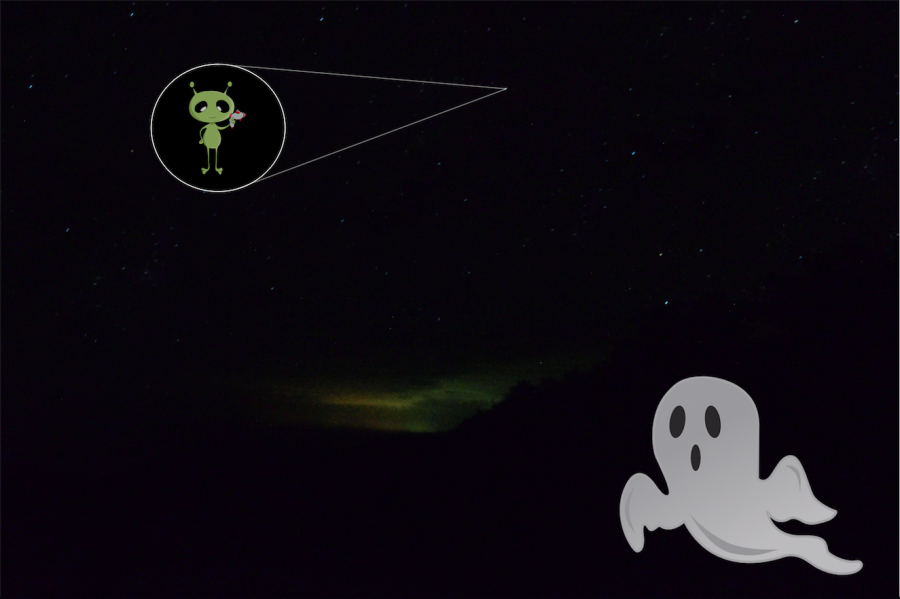Ghosts Versus Aliens
February 7, 2019
Recently, I have twice found myself in an intense conversation comparing the existence of ghosts and aliens. It started with a get-to-know-you game at an after-school club – we threw around a beach ball covered in questions and answered whichever question our pointer finger was on as we caught it. They were generally easy-breezy questions about your favorite color or whether you are habitually early or late. None of them sparked much conversation, much less debate, until a girl caught the ball, lifted her finger, and read, “Do you believe in ghosts? In aliens?”
I laughed at the question. The two questions seem incomparable to me, with an obvious answer. I was caught off guard at the catcher’s response and flat out shocked at the nods of agreement from around the circle. The general consensus seemed to be yes, both aliens and ghosts are real.
I have no problem with, and completely acknowledge, the existence of aliens — probability and logic points towards life outside our solar system. Ghosts, on the other hand, are not something I have ever considered to be in the realm of science or reality.
As a student journalist and activist, I am not one to back down on my opinion or shy away from a dispute. Our get-to-know-you game quickly evolved into a full debate. Club members took sides (literally, we stood on opposite sides of the room). The majority stood on the “both exist” side, quite a few more stood on the “aliens only” side, and a singular student stood firmly on team “ghosts only.”
By the end of the club meeting, no one had changed their minds or convinced anyone else to join them. The next week, I brought up the same topic in my journalism class. I was again astounded to learn that most of my peers, and my teachers, believed equally in the existence of ghosts and aliens.
When I say aliens, I don’t exactly mean the weird bug-eyed creatures that appear so often in sci-fi, nor do I mean that I believe aliens have ever visited or contacted Earth. I simply mean that there is life beyond Earth, outside of our solar system. From a point of basic probability, the odds that we are the only living creatures in the universe are incredibly low. The universe is expanding, as scientists have learned with the Doppler Effect and the shift in light emissions from distant galaxies.
As of now, scientists estimate around 200 billion galaxies in the universe. If you need a visual of how many that is, think about this: one million seconds is roughly 12 days, and a billion seconds is roughly 31.7 years.
200 billion seconds is roughly 6,342 years.
Speaking of 200 billion, that also happens to be an estimated number of stars in our own galaxy, the Milky Way. How can we possibly think we are the only life to exist when we live in a galaxy with billions and billions of stars and a universe with billions and billions of galaxies? In the words of astrophysicist Neil deGrasse Tyson in an essay for NASA’s Astrobiology magazine, “To declare that Earth must be the only planet in the cosmos with life would be inexcusably egocentric of us.”
On the other end of the scientific spectrum, there is a distinct lack of probability and science backing the existence of ghosts. Ghosts are an easy thing to say are true. When I asked my peers to back up their belief, many, including both teachers I discussed this with, told personal anecdotes of paranormal activities. Their stories made for good entertainment, but their memories prove little about the truth.
Memory is surprisingly unreliable, according to an article by Joyce W. Lacy and Craig E. L. Stark, published by the US National Library of Medicine National Institutes of Health. The biggest reason is memory distortion – where the way you remember something can be affected by a number of outside influences.
Even just the passage of time and the act of remembering distorts your memories. The article references a study done right after the September 11th terrorist attack in 2001, where people were asked to remember the event one week after, one year after, and three years after. The accounts people told changed after one year, and even more after three, though they remained fully confident in their report. People like to tell their memories as factual accounts of what happened, but the truth is not remembered so easily.
In addition to unreliable memories, supernatural occurrences themselves are surrounded by evidence pointing to the absence of real ghosts. In a study by the Department of Psychology at the University of London, eyewitness testimony of a paranormal event was tested with factors including verbal suggestion, social influence, and whether or not the subjects previously believed in the paranormal. The results showed that verbal suggestion and social influence in favor of the paranormal, as well as initial belief, all led to reports of a supernatural moment. Disbelievers, in addition to those, believers or not, who were not exposed to verbal or social influences, tended to see no paranormal aspects of the same situation.
Other studies reference factors such as mold spores, air quality, and the history and aesthetic of a location as explanations for ghostly “interactions,” whether hallucinations or imagination. Even infrasound, or sound lower than humans can hear, is sometimes cited as a reason for “ghost” sightings. Infrasound is produced all the time everywhere, by anything from fans to vibrating pipes to earthquakes and more. Though too low to be heard by humans, it can be felt, often in the form of headaches, nausea, or problems with sleep. If infrasound resonates at the exact frequency of the human eye, it can make the eyes vibrate and distort vision.
Vic Tandy, a British lecturer and researcher who focused on paranormal activities, recalled a story of working in a so-called “haunted” laboratory one night and feeling the hairs on the back of his neck stand up before seeing a black shape in the edge of his vision. The figure returned the next night, so Tandy investigated his surroundings, eventually discovering a silent fan in the laboratory that happened to vibrate at the same resonant frequency of the human eye. After turning it off, the strange sights and feelings disappeared. The laboratory’s haunted reputation was really just caused by a vibrating fan all along.
Looking at it all, the answer to the question written in Sharpie on a beach ball seems clear to me. “Do you believe in ghosts?” Ghosts have no science backing up their existence. In fact, science disproves the tales of ghostly encounters my teachers, my peers, and many others enjoy telling. The paranormal moments they remember were likely influenced by any number of factors, from what the place looked like to the amount of mold in the air. Beyond that, the memories they have of already fuzzy moments have only become more unreliable with time and retellings. “In aliens?” Absolutely. Though we’ve yet to have interactions with life outside our solar system, the existence of billions and billions of stars in billions and billions of galaxies in an ever-expanding universe points only to a universe with life on more planets than just Earth.



Cherie • Dec 7, 2020 at 5:45 AM
Although entertaining, your written piece lacked the complete “scientific findings” of the dead, spirits, ghosts, spectres. In fairness, researchers have recorded conversations with the dead in real time. Some of these recordings showed intelligent answers to specific questions.